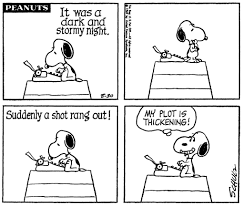Paul Whybrow
Full Member
These rules are not rules, as such, more pithy advice that's entered the neuroses of writers everywhere.
I've previously mentioned semicolons getting bashed by Kurt Vonnegut. Elmore Leonard also offered some grumpy advice to writers:
Elmore Leonard: 10 Rules for Good Writing - Gotham Writers Workshop
His rules include don't begin a story with the weather and don't use a prologue.
Bothered by such advice, which is so often contradicted by successfully published authors, I kept records of the last fifty novels I read in 2017, some bestsellers and award winners: twenty mentioned the weather on the first page and thirty had a prologue. Both devices served to set the scene for what was to come and contributed to a sense of unease. Take this famous example, from the opening of George Orwell’s Nineteen Eighty-Four:
It was a bright cold day in April, and the clocks were striking thirteen.
Dennis Lehane's Shutter Island has a labyrinthine plot designed to hoodwink the reader. The prologue contains a lot of foreshadowing that an observant reader would be wise to consider. Even the epigraph gives a clue as to where the story is going:
'must we dream our dreams and have them, too?'
—Elizabeth Bishop,
Questions of Travel
I haven't used a prologue in any of my four Cornish Detective novels, though two of them begin with detailed descriptions of the weather, which influences the crime that takes place, as well as interfering with the pursuit of the offender. They were set in the wettest winter on record and the hottest summer for forty years, so it would have been foolish to ignore them; the weather became another character.
Literary agents are said to detest prologues. But, as a reader, I don't mind them—sometimes referring back to them to look for clues in a mystery story.
Another common piece of advice is to avoid using contemporary references, such as news events, as this will date your book, so much so, that in ten years time no one will want to read it. Firstly, you'll be fortunate if your novel is still attracting attention in a decade, so that's a foolish thing to worry about. Also, what's happening in your character's life is affected by the decisions of politicians, natural disasters and warfare. One of my Cornish Detective novels was set at the time of the Brexit referendum, and the voters' decision that we leave the European Union directly harmed the finances of the farmers I was writing about, driving one man to commit a crime.
A similar thing is said about not inflicting an 'info dump' on your readers. I agree, that this can be distracting for the reader, and they may skip reading it if done with a heavy hand, but at least they're aware of why the characters are behaving as they do. I explained the psychological mindset of a serial killer by referencing the trauma he went through as a boy soldier in the genocide of the Bosnian War of Independence. Had I not done so, he would have simply come across as a sadistic psychopath, a two-dimensional bogeyman.
Contemporary references and info dumps can act as tethers, which help to locate the reader's imagination rather than restricting it.
Are there any so-called writing rules that drive you mad, and which you quite happily break?

I've previously mentioned semicolons getting bashed by Kurt Vonnegut. Elmore Leonard also offered some grumpy advice to writers:
Elmore Leonard: 10 Rules for Good Writing - Gotham Writers Workshop
His rules include don't begin a story with the weather and don't use a prologue.
Bothered by such advice, which is so often contradicted by successfully published authors, I kept records of the last fifty novels I read in 2017, some bestsellers and award winners: twenty mentioned the weather on the first page and thirty had a prologue. Both devices served to set the scene for what was to come and contributed to a sense of unease. Take this famous example, from the opening of George Orwell’s Nineteen Eighty-Four:
It was a bright cold day in April, and the clocks were striking thirteen.
Dennis Lehane's Shutter Island has a labyrinthine plot designed to hoodwink the reader. The prologue contains a lot of foreshadowing that an observant reader would be wise to consider. Even the epigraph gives a clue as to where the story is going:
'must we dream our dreams and have them, too?'
—Elizabeth Bishop,
Questions of Travel
I haven't used a prologue in any of my four Cornish Detective novels, though two of them begin with detailed descriptions of the weather, which influences the crime that takes place, as well as interfering with the pursuit of the offender. They were set in the wettest winter on record and the hottest summer for forty years, so it would have been foolish to ignore them; the weather became another character.
Literary agents are said to detest prologues. But, as a reader, I don't mind them—sometimes referring back to them to look for clues in a mystery story.
Another common piece of advice is to avoid using contemporary references, such as news events, as this will date your book, so much so, that in ten years time no one will want to read it. Firstly, you'll be fortunate if your novel is still attracting attention in a decade, so that's a foolish thing to worry about. Also, what's happening in your character's life is affected by the decisions of politicians, natural disasters and warfare. One of my Cornish Detective novels was set at the time of the Brexit referendum, and the voters' decision that we leave the European Union directly harmed the finances of the farmers I was writing about, driving one man to commit a crime.
A similar thing is said about not inflicting an 'info dump' on your readers. I agree, that this can be distracting for the reader, and they may skip reading it if done with a heavy hand, but at least they're aware of why the characters are behaving as they do. I explained the psychological mindset of a serial killer by referencing the trauma he went through as a boy soldier in the genocide of the Bosnian War of Independence. Had I not done so, he would have simply come across as a sadistic psychopath, a two-dimensional bogeyman.
Contemporary references and info dumps can act as tethers, which help to locate the reader's imagination rather than restricting it.
Are there any so-called writing rules that drive you mad, and which you quite happily break?




